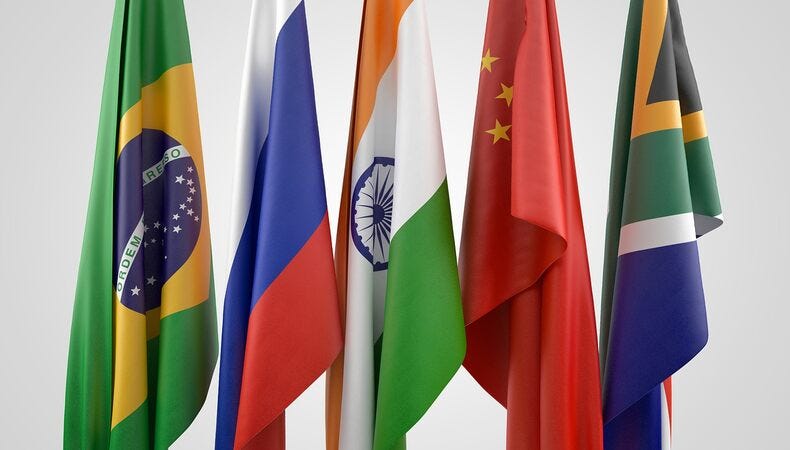
Turkey may soon undergo a significant transformation in its diplomatic stance by joining BRICS, a coalition of emerging-market countries striving to challenge Western political and economic dominance. According to a recent statement by a spokesperson for Turkey’s ruling AK Party, the process for Turkey to join BRICS is “underway.” If successful, this move would make Turkey the first NATO member to join this rapidly growing international alliance.
The BRICS group originally consisted of Brazil, Russia, India, and China, with South Africa joining later. Over time, it has evolved into a bloc that seeks to counterbalance the global order traditionally led by the United States and Europe. Other countries, such as Ethiopia, Iran, Egypt, and the United Arab Emirates, have already joined, while Saudi Arabia has been invited but has not yet joined. Turkey’s potential membership could add yet another layer of complexity to global geopolitics.
Omer Celik, a spokesperson for Turkey’s ruling party, emphasized the nation’s desire to join BRICS, citing President Recep Tayyip Erdoğan’s repeated interest in the alliance. However, while Turkey’s intentions are clear, there have been no specific developments yet, as reported by Reuters.
Joining BRICS would give Turkey a chance to diversify its foreign relationships. For decades, Turkey has been a candidate for European Union membership, but in recent years, its relations with Western nations have become strained. Despite NATO’s criticism of Russia’s actions in Ukraine, Turkey has maintained its diplomatic ties with Moscow and continues to foster relations with China, creating tension within the military alliance.
A New Global Role for Turkey?
If Turkey successfully joins BRICS, it would be the first NATO member and the first EU candidate country to do so. This could complicate Turkey’s relationships with its Western allies, signaling a shift toward a more autonomous foreign policy. Analysts suggest that this is part of President Erdoğan’s broader strategy to free Turkey from its dependence on NATO and the EU.
Turkey has long been walking a fine line between its Western commitments and its growing partnerships with countries like Russia and China. As Asli Aydıntaşbaş, a visiting fellow at the Brookings Institution, explained, Turkey is hedging its bets: “Turkey doesn’t want to abandon NATO or its EU aspirations, but it is looking to diversify its alliances.”
This evolving foreign policy stance is not entirely surprising. Despite mounting pressure from its NATO partners, Turkey has continued to engage with Russia and China. Some observers believe that Turkey no longer sees NATO membership as the sole foundation of its foreign policy. Instead, it is increasingly interested in exploring new alliances that could give it greater influence on the global stage.
Complications for NATO and the West
Turkey’s ongoing engagement with Russia, especially against the backdrop of the Ukraine conflict, has already caused significant friction within NATO. While most NATO countries have taken a unified stance against Russia’s invasion, Turkey has maintained economic and diplomatic ties with Moscow. Simultaneously, Turkey’s cooperation with China, particularly through infrastructure and trade initiatives, has further strained its relations with the West.
If Turkey joins BRICS — a group that includes both Russia and China — it raises questions about its future role in NATO. Can Turkey maintain its commitments to the alliance while aligning with a bloc that opposes Western dominance? Or does this signal a deeper shift away from the West? While Turkey may be exploring new alliances, experts believe it is unlikely to completely sever ties with NATO or abandon its EU ambitions. Instead, Turkey seems to be positioning itself as a nation capable of navigating multiple geopolitical spheres.
Erdoğan’s Vision of Independence
President Erdoğan has long promoted a vision of national independence, both politically and economically. His foreign policy, often referred to as a “balancing act,” seeks to carve out a unique role for Turkey in global affairs. By strengthening ties with Russia and China while maintaining its NATO commitments, Turkey aims to maximize its global influence without over-relying on any one set of alliances.
However, this strategy comes with risks. Joining BRICS — a group that actively challenges Western hegemony — could further strain Turkey’s relationships with the European Union and its NATO allies. While Erdoğan’s government views this as a way to diversify Turkey’s foreign policy, it may push the country even further away from the West, raising questions about the long-term sustainability of its current diplomatic approach.
The Future of Turkey’s Global Role
As Turkey continues its bid to join BRICS, the world is watching closely to see how this potential realignment will affect its standing within NATO and its relations with Western nations. Turkey’s balancing act between its traditional alliances and new partnerships in the East mirrors broader geopolitical shifts taking place in a rapidly changing world order. Whether Turkey’s BRICS membership leads to closer ties with Russia and China or further alienates it from the West remains to be seen.
One thing is clear: Turkey is determined to forge its own path on the global stage. By pursuing BRICS membership, Turkey is signaling that it no longer views its Western alliances as the sole framework for its foreign policy. Instead, it seeks to become a key player in both the East and the West, navigating the complexities of modern geopolitics with a focus on autonomy and strategic flexibility.
